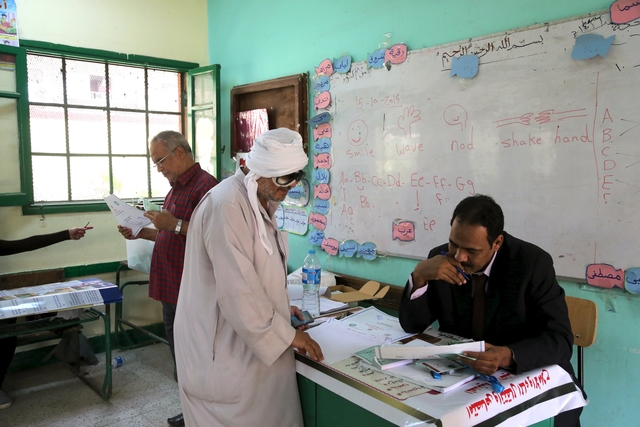Latest NEWS
- Aswat Masriya, the last word
- Roundup of Egypt's press headlines on March 15, 2017
- Roundup of Egypt's press headlines on March 14, 2017
- Former Egyptian President Hosni Mubarak to be released: lawyer
- Roundup of Egypt's press headlines on March 13, 2017
- Egypt's capital set to grow by half a million in 2017
- Egypt's wheat reserves to double with start of harvest -supply min
- Roundup of Egypt's press headlines on March 12, 2017
Egypt government and media scurry to reverse low voter turnout

An Egyptian citizens casts his vote on the second day and last day of the first of two phases of parliamentary elections, on Oct 19, 2015. Reuters photo
By Deena Gamil
The Egyptian government reduced working hours and gave citizens access to free transportation in some areas in a frenzied quest to boost voter turnout at the parliamentary polls, just as the media invested airtime in a concerted effort to rally citizens.
Voting inside Egypt in the first of two phases to elect members of the House of Representatives started on Sunday and will end on Monday night.
These are the first elections held under President Abdel Fattah al-Sisi. Pundits have warned Egyptians that a low turnout would cast doubt on the "political legitimacy" of the incoming legislature.
Noor Farahat, a philosophy professor from Zagazig university told Aswat Masriya that the "weak" participation symbolises how the Egyptians people "have turned their backs on the entire political process, in light of elections whose legal framework results in a one-vote parliament."
He added that legal legitimacy is not a substitute for political or popular legitimacy.
Reacting to the apparent voter apathy, government officials have taken several measures to boost participation rates.
The governor of the northern Mediterranean province of Alexandria decided to offer free public transportation from 1.00 to 9.00 pm to facilitate voting.
Meanwhile, in Matruh, also a coastal Mediterranean province, the governor allocated buses to transport residents of Egypt's smallest village, al-Jara Om Saghir to their polling station, located 300 kilometeres away.
In the Upper Egyptian province of Minya, the local university president decided to cancel lectures scheduled past noon to allow faculty and students alike to vote. Similarly, Cairo International Airport gave workers a two-hour leave at midday.
Sisi called on Egyptians, especially youth, to "line up" outside polling stations on the eve of the start of voting inside Egypt, but by Sunday afternoon, the turnout was a paltry 2.27 percent, according to the spokesman of the Supreme Elections Commission (SEC).
SEC noted on Sunday a clear absence of young voters and a marked presence of elderly citizens at polling stations.
Indeed, for many young Egyptians participation took the form of poking fun at voting on Twitter using hashtags like "#instead_of_voting" and "#no_one_went." One tweet read: "Breaking news: reports suggest that the number of youth who participated in the parliamentary elections today has hit 266, across the nation."
Media Rallies
Controversial television host Ahmed Moussa said on his show "My Responsibility" on privately-owned Sada Elbalad channel that "Sisi is unhappy with the participation rates."
While he contended that he did not speak with the president to quote him directly, he based his deduction on his personal analysis.
"If I am upset and you [viewers] are upset ... surely the president is in the same state as the people," he said as he called on people to cast their votes.
While headlines across the international press, noted "apathy" and "low turnout", the local media continued to reflect the state of polarisation in Egypt, running rather paradoxical headlines.
The state's Al-Akhbar newspaper described a "faint" turnout and the privately owned Al-Masry Al-Yuom said "the people ignore the representatives," but al-Gomhouria, another state-owned newspaper ran the headline, "Egypt once more impresses the world ... the people defy terror and elect representatives."
SEC has not announced any more percentages on the turnout rate but Prime Minister Sherif Ismail said on Monday that the turnout rate on Sunday ranged between 15 and 16 percent.
Ismail said he expected a higher turnout today, Monday, after the state gave public employees a half day off to allow them to cast their votes.
He also called on the private sector to facilitate procedures for employees to exercise their right to vote.
Perhaps signaling that the government's measures may be paying off, a judicial source told Aswat Masriya that the turnout rate in polling stations in Alexandria were between eight and 15 percent on Monday.
Nonetheless, the preliminary figures on the turnout rates are significantly lower than those of the 2014 presidential race which brought Sisi to power. The turnout rate announced by SEC at the time was 47.45 percent.
There are over 27.4 million eligible voters in the first phase of the elections which includes 14 of Egypt's 27 provinces. Around two thirds of the 2,573 candidates running for individual seats are independents, while the rest belong to parties.
The elections represent the final step in Egypt's "roadmap to democracy", announced by then-Defence Minister Sisi in July 2013, following the military ouster of President Mohamed Mursi, who hails from the Muslim Brotherhood, designated a "terrorist organization" in December 2013. The group, whose political arm the Freedom and Justice Party, swept the 2012 parliamentary polls, has called for a boycott of the 2015 elections.
The second phase of voting in Egypt and abroad is slated for Nov. 21-23.
The ongoing elections mark the first electoral poll held in the absence of the Muslim Brotherhood in 30 years.










